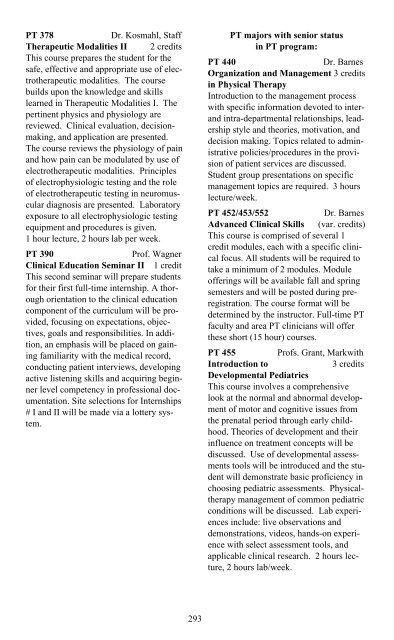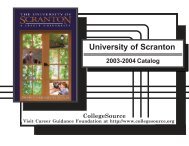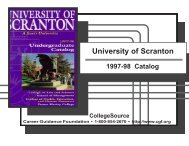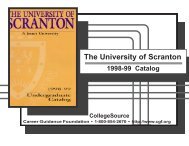1999-2000 - The University of Scranton
1999-2000 - The University of Scranton
1999-2000 - The University of Scranton
You also want an ePaper? Increase the reach of your titles
YUMPU automatically turns print PDFs into web optimized ePapers that Google loves.
PT 378 Dr. Kosmahl, Staff<br />
<strong>The</strong>rapeutic Modalities II 2 credits<br />
This course prepares the student for the<br />
safe, effective and appropriate use <strong>of</strong> electrotherapeutic<br />
modalities. <strong>The</strong> course<br />
builds upon the knowledge and skills<br />
learned in <strong>The</strong>rapeutic Modalities I. <strong>The</strong><br />
pertinent physics and physiology are<br />
reviewed. Clinical evaluation, decisionmaking,<br />
and application are presented.<br />
<strong>The</strong> course reviews the physiology <strong>of</strong> pain<br />
and how pain can be modulated by use <strong>of</strong><br />
electrotherapeutic modalities. Principles<br />
<strong>of</strong> electrophysiologic testing and the role<br />
<strong>of</strong> electrotherapeutic testing in neuromuscular<br />
diagnosis are presented. Laboratory<br />
exposure to all electrophysiologic testing<br />
equipment and procedures is given.<br />
1 hour lecture, 2 hours lab per week.<br />
PT 390 Pr<strong>of</strong>. Wagner<br />
Clinical Education Seminar II 1 credit<br />
This second seminar will prepare students<br />
for their first full-time internship. A thorough<br />
orientation to the clinical education<br />
component <strong>of</strong> the curriculum will be provided,<br />
focusing on expectations, objectives,<br />
goals and responsibilities. In addition,<br />
an emphasis will be placed on gaining<br />
familiarity with the medical record,<br />
conducting patient interviews, developing<br />
active listening skills and acquiring beginner<br />
level competency in pr<strong>of</strong>essional documentation.<br />
Site selections for Internships<br />
# I and II will be made via a lottery system.<br />
293<br />
PT majors with senior status<br />
in PT program:<br />
PT 440 Dr. Barnes<br />
Organization and Management 3 credits<br />
in Physical <strong>The</strong>rapy<br />
Introduction to the management process<br />
with specific information devoted to interand<br />
intra-departmental relationships, leadership<br />
style and theories, motivation, and<br />
decision making. Topics related to administrative<br />
policies/procedures in the provision<br />
<strong>of</strong> patient services are discussed.<br />
Student group presentations on specific<br />
management topics are required. 3 hours<br />
lecture/week.<br />
PT 452/453/552 Dr. Barnes<br />
Advanced Clinical Skills (var. credits)<br />
This course is comprised <strong>of</strong> several 1<br />
credit modules, each with a specific clinical<br />
focus. All students will be required to<br />
take a minimum <strong>of</strong> 2 modules. Module<br />
<strong>of</strong>ferings will be available fall and spring<br />
semesters and will be posted during preregistration.<br />
<strong>The</strong> course format will be<br />
determined by the instructor. Full-time PT<br />
faculty and area PT clinicians will <strong>of</strong>fer<br />
these short (15 hour) courses.<br />
PT 455 Pr<strong>of</strong>s. Grant, Markwith<br />
Introduction to 3 credits<br />
Developmental Pediatrics<br />
This course involves a comprehensive<br />
look at the normal and abnormal development<br />
<strong>of</strong> motor and cognitive issues from<br />
the prenatal period through early childhood.<br />
<strong>The</strong>ories <strong>of</strong> development and their<br />
influence on treatment concepts will be<br />
discussed. Use <strong>of</strong> developmental assessments<br />
tools will be introduced and the student<br />
will demonstrate basic pr<strong>of</strong>iciency in<br />
choosing pediatric assessments. Physicaltherapy<br />
management <strong>of</strong> common pediatric<br />
conditions will be discussed. Lab experiences<br />
include: live observations and<br />
demonstrations, videos, hands-on experience<br />
with select assessment tools, and<br />
applicable clinical research. 2 hours lecture,<br />
2 hours lab/week.
















